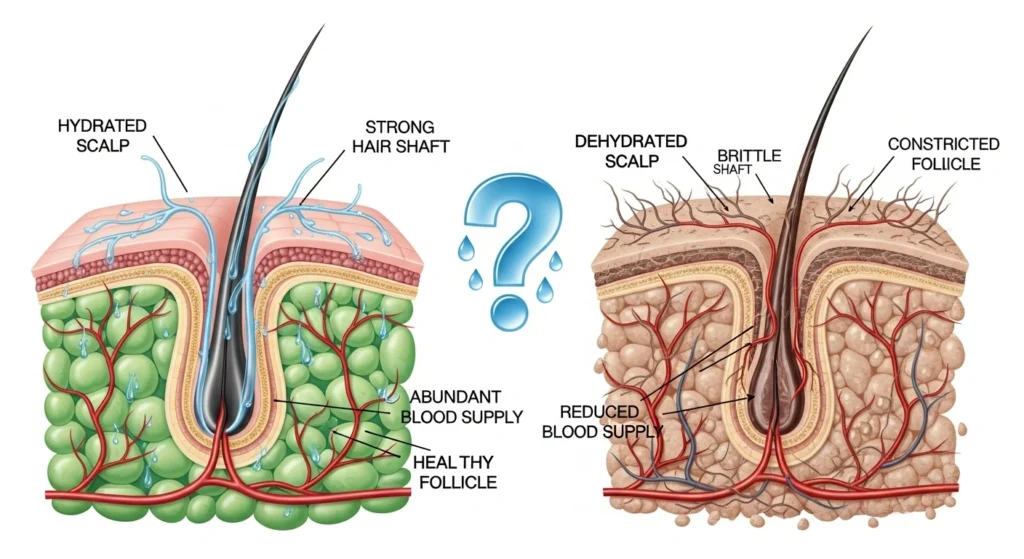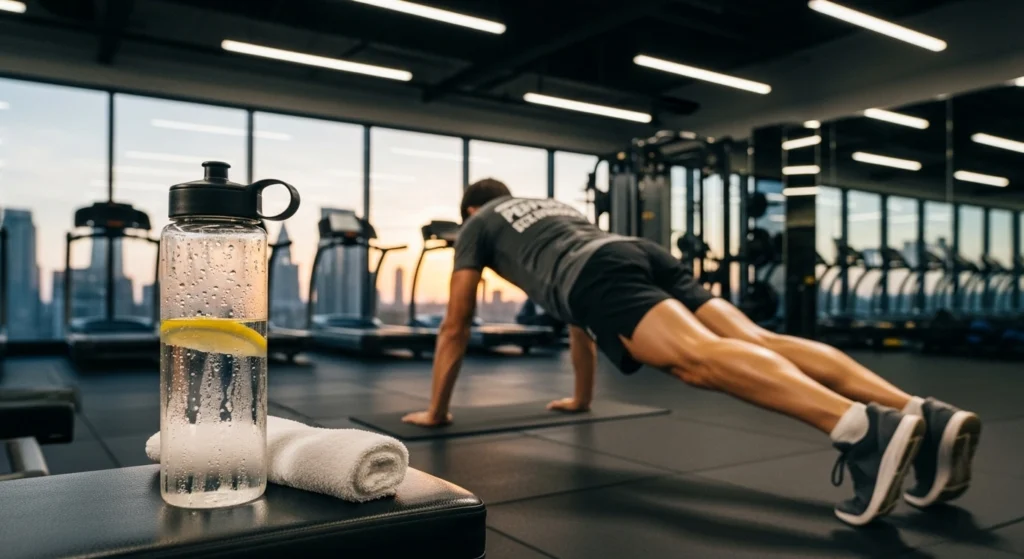Summary
Dehydration can significantly impact hair health, leading to dry scalp, hair thinning, and increased shedding. Can not drinking water cause hair loss?
Yes, it can disrupt the hair growth cycle and weaken hair follicles. Staying hydrated is crucial for maintaining healthy hair, and rehydrating your body can help restore moisture to the scalp and improve hair health over time.
Introduction
Many people often overlook the importance of hydration when it comes to maintaining healthy hair. Can not drinking water cause hair loss? The answer is yes. Dehydration can significantly affect your scalp and hair follicles, leading to dry, brittle hair and even hair shedding.
In this article, we will explore how dehydration impacts hair health, why water is essential for hair growth, and provide actionable tips on how to stay hydrated to prevent hair loss.
How Does Dehydration Affect Hair Growth?

The Role of Water in the Body
Water is essential for overall body function, including hair growth. Our bodies are composed of about 60% water, and this hydration helps deliver nutrients to hair follicles. When you are dehydrated, your body prioritizes vital organs over non-essential systems, which means your hair follicles may not receive the nutrients they need to grow strong, healthy hair.
Impact on Scalp Health
One of the first places dehydration manifests is the scalp. A dry scalp is a common symptom of dehydration, which leads to irritation, itching, and an increase in dandruff. A dehydrated scalp can become inflamed, leading to weakened hair follicles and, in some cases, hair loss. The lack of moisture in your scalp can disrupt the hair growth cycle, leading to more shedding.
Water’s Effect on Hair Follicles and Growth Cycle
Your hair grows in cycles: the anagen (growth), catagen (transitional), and telogen (resting) phases. Dehydration can shorten the growth phase, causing hair to shed prematurely. Water helps keep the follicles well-nourished and healthy, and when hydration levels drop, this cycle may be disrupted, leading to hair thinning.
Symptoms of Dehydration That Can Lead to Hair Loss
Dry Skin and Scalp
When the body is dehydrated, it often results in dry skin, including the scalp. This dryness can cause flakes and itchiness, both of which make it harder for your hair follicles to thrive. A dry scalp can also prevent hair from growing properly, leading to noticeable thinning over time.
Thinning Hair
Lack of proper hydration leads to a lack of moisture in the hair shaft itself. Dehydrated hair becomes dry and brittle, making it prone to breakage. If your hair is constantly breaking, it can result in thinning strands that seem to shed more than usual.
Increased Hair Shedding
Dehydration can also cause hair follicles to enter the telogen (resting) phase prematurely. When this happens, hair becomes more likely to shed. Increased hair shedding is often one of the first signs of dehydration, and if left unaddressed, it can lead to more significant hair thinning.
How Much Water Should You Drink for Healthy Hair?
Recommended Daily Water Intake for Hair Health
The average recommended daily water intake is around 8 cups (64 ounces) for most people, but this can vary depending on individual needs such as age, activity level, and climate. If you are experiencing hair loss, it’s important to increase your water intake to promote optimal hair growth. A good guideline is to drink about 1 ounce of water for every pound of body weight. For example, if you weigh 150 pounds, aim to drink 150 ounces of water a day.
How Hydration Affects the Quality of Hair
Hydration doesn’t just support hair growth; it improves the texture and overall appearance of your hair. Well-hydrated hair is shinier, smoother, and less prone to frizz or breakage. In addition to drinking enough water, consider incorporating water-rich foods like cucumbers, watermelon, and leafy greens into your diet for an extra boost.
Hydration Tips for Optimal Hair Health
- Drink water consistently throughout the day: Carry a water bottle to remind yourself to drink regularly.
- Consume water-rich foods: Include fruits and vegetables like oranges, celery, and tomatoes, which are packed with water.
- Consider herbal teas: Non-caffeinated beverages like chamomile tea can help with hydration.
- Set hydration reminders: Use apps or alarms to remind you to take a drink.
Can Drinking More Water Reverse Hair Loss Caused by Dehydration?
The Role of Hydration in Recovery
Rehydrating your body can restore hair health, especially if the dehydration was a key factor in hair loss. Once your body receives adequate hydration, it can begin to replenish moisture in the scalp and hair follicles. However, reversing hair loss caused by dehydration might take time, depending on the extent of the damage.
Timeline for Hair Restoration After Dehydration
While the timeline varies for each person, you can expect to see improvements in hair texture, reduced shedding, and overall hair health within a few weeks of rehydrating. If dehydration has caused significant damage to hair follicles, full recovery may take a few months of consistent hydration and scalp care.
How to Prevent Hair Loss Due to Dehydration
Healthy Hydration Habits
- Drink water regularly: Try to drink small amounts throughout the day to maintain hydration levels.
- Monitor your hydration: Keep track of your water intake to ensure you’re meeting your body’s needs.
Skincare and Hair Care Tips to Complement Hydration
- Use moisturizing hair care products to help maintain scalp health.
- Avoid harsh chemicals and shampoos that may dry out the scalp.
Exercise and Hydration
During physical activities, always hydrate before, during, and after exercise to prevent dehydration and ensure your hair stays healthy.

FAQs About Dehydration and Hair Loss
Can dehydration cause permanent hair loss?
While dehydration does not typically cause permanent hair loss, it can contribute to hair thinning and excessive shedding if not addressed.
How long does it take to see improvement in hair after rehydrating?
It can take several weeks to months to see noticeable improvements in hair health after increasing water intake, depending on the severity of dehydration.
Does drinking more water improve the thickness of my hair?
Proper hydration helps improve hair texture and shine, but it won’t necessarily increase hair thickness. However, by reducing hair breakage, your hair will appear fuller.
What are some natural remedies for a dry scalp caused by dehydration?
In addition to drinking water, you can use natural oils like coconut or argan oil to hydrate the scalp. Gentle, hydrating shampoos can also help restore moisture.
Final Thoughts
If you’re experiencing hair loss or thinning due to dehydration, consult with one of our specialists today. Book a consultation with Dr. Rana Irfan in Islamabad to get personalized recommendations and solutions for maintaining healthy, hydrated hair.
Proper hydration is essential not only for your overall health but also for the health of your hair. By increasing your water intake and following a few simple tips, you can prevent dehydration-related hair loss and improve the strength and appearance of your hair.
